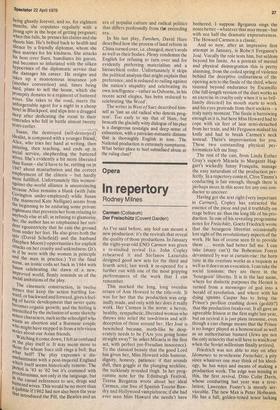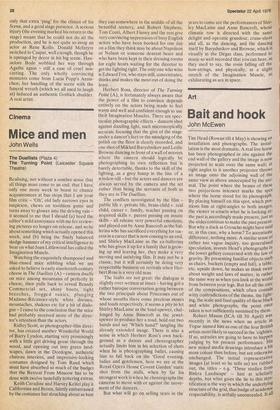Opera
In repertory
Rodney Milnes
Carmen (Coliseum) Der Frelschutz (Covent Garden) As I've said before, any fool can mount a new production: it's the revivals that reveal
the quality of those productions. In January the eight-year-old ENO Carmen was given a re-studied revival (i.e. John Copley rehearsed it and Stefanos Lazaridis designed good new sets for the third and fourth acts); last week it re-opened for a further run with one of the most gripping performances of the work that I can remember.
This marked the long, long overdue return of Ann Howard to the title-role. It was for her that the production was originally made, and only with her does it really work. Her Carmen is the norm: a heroic, healthy, sympathetic, liberated woman who throws into relief the tawdriness and selfdeception of those around her. Her Jose is bewitched because, moth-like he desperately needs to be ('Are you going home straight away?' he askes Micaela in the first act, with perfect pre-Freudian innocence). To the classical beauty that the good Lord has given her, Miss Howard adds humour, dignity, honesty, patience: if that sounds dull, then goggle at the plunging neckline, the recklessly revealed thigh. In her programme note for the Edinburgh Festival, Teresa Berganza 1,Vrote about her ideal Carmen, one free of Spanish Tourist Bawdry and Hollywood vampishness; if she had ever seen Miss Howard she needn't have bothered. I suppose Bprganza sings the notes better —whatever that may mean —but with not half the dramatic expressiveness. The Howard Carmen is a classic.
And so now, after an impressive first attempt in January, is Robert Ferguson's Jose. Vocally the role tests him, but seldom beyond his limits. As a portrait of mental and physical disintegration this is pretty alarming, from the coiled spring of violence behind the deceptive ordinariness of the opening acts to the finale of the third, where taunted beyond endurance by Escamillo (the full-length version of the duet works as an exercise in cruelty only when it is so brilliantly directed) his mouth starts to work and his eyes protrude from their sockets — a truly nasty moment. The finale is harrowing enough as it is, but here Miss Howard had to cope with six feet of lace semi-detached from her train, and Mr Ferguson mislaid his knife and had to break Carmen's neck instead. There's improvisation for you. These two outstanding physical performances left me limp.
The rest of the cast, from Linda Esther Gray's superb Micaela to. Margaret Haggart's wickedly funny Frasquita, manage the easy naturalism of the production perfectly. In a repertory context, Clive Timms's conducting is fair enough, though there is perhaps more in this score for any one conductor to uncover.
Having got the text right (very important in Carmen), Copley has extracted the essence of the piece and put it truthfully on stage before us: thus the long life of his production. In one of his revealing programme notes for Freischiitz, Goetz Friedrich wrote
that the bourgeois librettist occasionally lost sight of the revolutionary aspects of the work. He has of course seen fit to provide them . . . words had better fail me. I can take (many can't) the Bohemian Forest devastated by war at curtain-rise: the horn tune in the overture works as a requiem as well as it does as an evocation. I can take the social tensions: they are there in the 'bourgeois' libretto. It is in the last scene, where for dialectic purposes the Hermit is turned from a messenger of god into a herald of revolution, and where with his dying spasms Caspar has to bring the Prince's pavilion crashing down (geddit?) that the production freaks out. It all gave an agreeable frisson at the first night last year, but on revival it is just plain tiresome, even though a cast change means that the Prince is no longer played as a homosexual as well as an authoritarian bastard (Jews are not the only minority that will have to watch out when the Soviet millenium finally arrives).
Friedrich was not able to stay on after ldomeneo to re-rehearse Freischatz, a pity
since whatever one may think of his ideol ogy, he has ways and means of making a production work. The edge was missihg at this, the first revival. Ditto Colin Davis, whose conducting last year was a revelation; Lawrence Foster's is merely ser viceable. The new Max is Peter Hofmann. He has a full, golden-toned tenor lacking
only that extra 'ping' for the climax of his Scena, and a good stage presence. A serious injury (the evening marked his return to the stage) meant that he could not do all the production, and he is not quite so innig an actor as Rene Kollo. Donald McIntyre switched to Caspar, well enough, though he is upstaged by decor in his big scene. Hannelore Bode wobbled her way through Agathe again — still a case of cruel miscasting. The only wholly convincing moments come from Lucia Popp's Aennchen; her handling of the scene with the funeral wreath (which we all used to laugh at) induced an authentic Gothick shudder. A real artist.



































 Previous page
Previous page